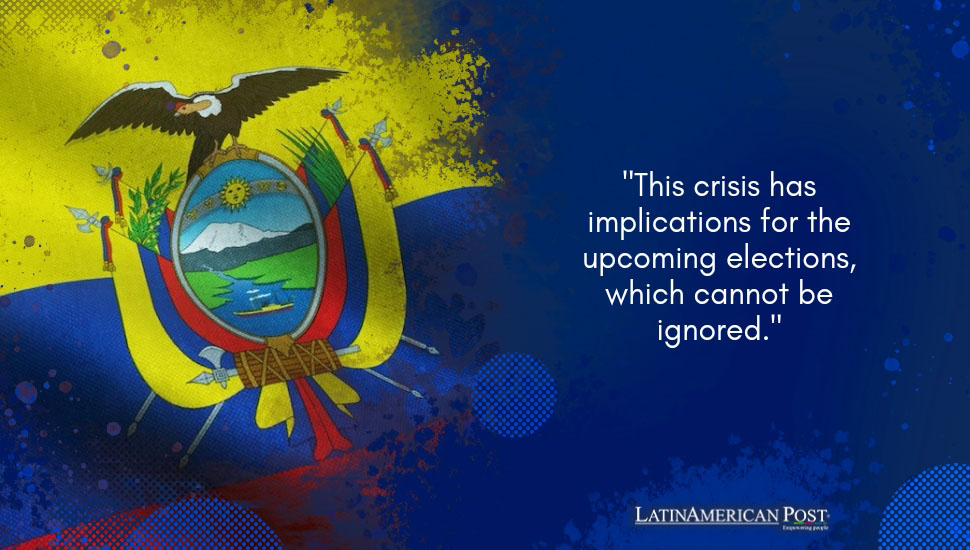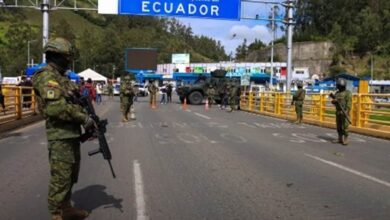Power Struggle in Ecuador Amid Election Uncertainty is a Threat to Democracy

The ongoing power struggle within Ecuador’s Tribunal Contencioso Electoral (TCE) is not just an internal conflict—it poses a serious threat to the integrity of the country’s democracy. This crisis has implications for the upcoming elections, which cannot be ignored.
Ecuador’s democracy is facing a critical test as the Tribunal Contencioso Electoral (TCE), responsible for overseeing the nation’s elections, finds itself embroiled in a bitter leadership dispute. What should have been a time of preparation and stability in the lead-up to the 2025 elections has instead devolved into a chaotic power struggle, with Ivonne Coloma and Fernando Muñoz claiming the TCE’s presidency. This crisis is more than just a bureaucratic squabble; it undermines the very foundation of democratic governance in Ecuador.
At the heart of any democracy is the principle of free and fair elections. As the guardian of this principle in Ecuador, the TCE plays a crucial role in ensuring that electoral processes are conducted transparently and impartially. However, the current turmoil within the tribunal calls into question its ability to fulfill this responsibility. With Coloma asserting her authority as the new president and Muñoz rejecting his removal as illegal, the TCE is mired in uncertainty. This instability could have severe consequences for the upcoming elections, scheduled for February 2025, where the next president and National Assembly members will be elected.
Ecuador’s democracy relies on institutions like the TCE to operate above political frays, acting as neutral arbiters in the electoral process. But when the institution is in disarray, the public’s confidence in the fairness of elections is inevitably shaken. The TCE’s internal conflict distracts from its core mission and raises legitimate concerns about whether the upcoming elections will be conducted without bias or undue influence. This dangerous precedent could erode trust in the electoral system, which is the bedrock of democratic participation.
A Dangerous Precedent for Governance
The leadership crisis within the TCE sets a troubling precedent for governance in Ecuador. If the nation’s highest electoral body can be subject to such overt manipulation and internal discord, what does this say about the state of other democratic institutions? The removal of Muñoz, followed by the swift installation of Coloma, suggests that even the most critical institutions can be swayed by political maneuvering. This instability at the top levels of electoral oversight is not just a crisis of leadership—it’s a crisis of democracy.
Moreover, this conflict will likely have a ripple effect across other government and civil society branches. As the TCE’s credibility diminishes, so too does the legitimacy of the electoral outcomes it oversees. If the public perceives the elections as rigged or influenced by internal power struggles, the results will be tainted no matter who wins. This could lead to widespread disillusionment with the democratic process, reducing voter turnout and increasing the potential for post-election unrest. In a country with high political polarization, this is a risk Ecuador cannot afford.
Political Motivations and Their Consequences
While both Coloma and Muñoz assert their legitimacy, it is clear that this power struggle is rooted in deeper political motivations. Muñoz’s insistence that his removal was “illegal” and Coloma’s counterclaim of rightful leadership reflect a broader battle for control within Ecuador’s political landscape. This is not just about who leads the TCE—it’s about who holds sway over the country’s electoral processes and, by extension, its future leadership.
The timing of this conflict is particularly concerning. With critical elections on the horizon, any perceived or actual bias in the TCE’s operations could influence the outcome. For instance, the tribunal currently handles cases involving high-profile figures like Vice President Verónica Abad, whose political future could be dramatically altered by the TCE’s rulings. If the TCE’s decisions are seen as politically motivated, this will further erode public trust in the institution and, by extension, the democratic process.
The situation is further complicated by the accusations of gender-based political violence against President Daniel Noboa, which are also under the TCE’s jurisdiction. The outcome of this case and how it is handled amidst the tribunal’s internal chaos could have far-reaching implications for the individuals involved and the broader perception of justice and fairness in Ecuador.
Democracy at a Crossroads
Ecuador is at a crossroads. The outcome of the TCE’s internal conflict will have significant implications for the country’s democratic future. If this crisis is not resolved swiftly and transparently, the damage to Ecuador’s democratic institutions could be long-lasting. The TCE must not only resolve its leadership dispute but also restore its credibility in the eyes of the public. This requires a recommitment to the principles of impartiality, transparency, and fairness that are essential to the functioning of any democracy.
The stakes are high. The TCE’s ability to oversee free and fair elections is fundamental to maintaining the legitimacy of Ecuador’s democratic process. If the tribunal fails in this duty, the consequences could be dire, leading to increased political instability, diminished public trust, and the potential unraveling of democratic norms. Ecuador’s leaders, particularly those within the TCE, must recognize the gravity of this moment and act not out of personal or political interest but in the service of the nation’s democratic integrity.
Also read: Action Plan Needed for Marine Turtle Conservation Efforts During Ecuador COP11
The leadership crisis within Ecuador’s Tribunal Contencioso Electoral is not just an internal issue but a direct threat to the country’s democracy. As the TCE grapples with this power struggle, the integrity of the upcoming elections hangs in the balance. This conflict must be resolved in a manner that restores public trust and upholds the principles of democracy essential to Ecuador’s future. Without this, the very foundation of Ecuador’s democratic governance is at risk.





